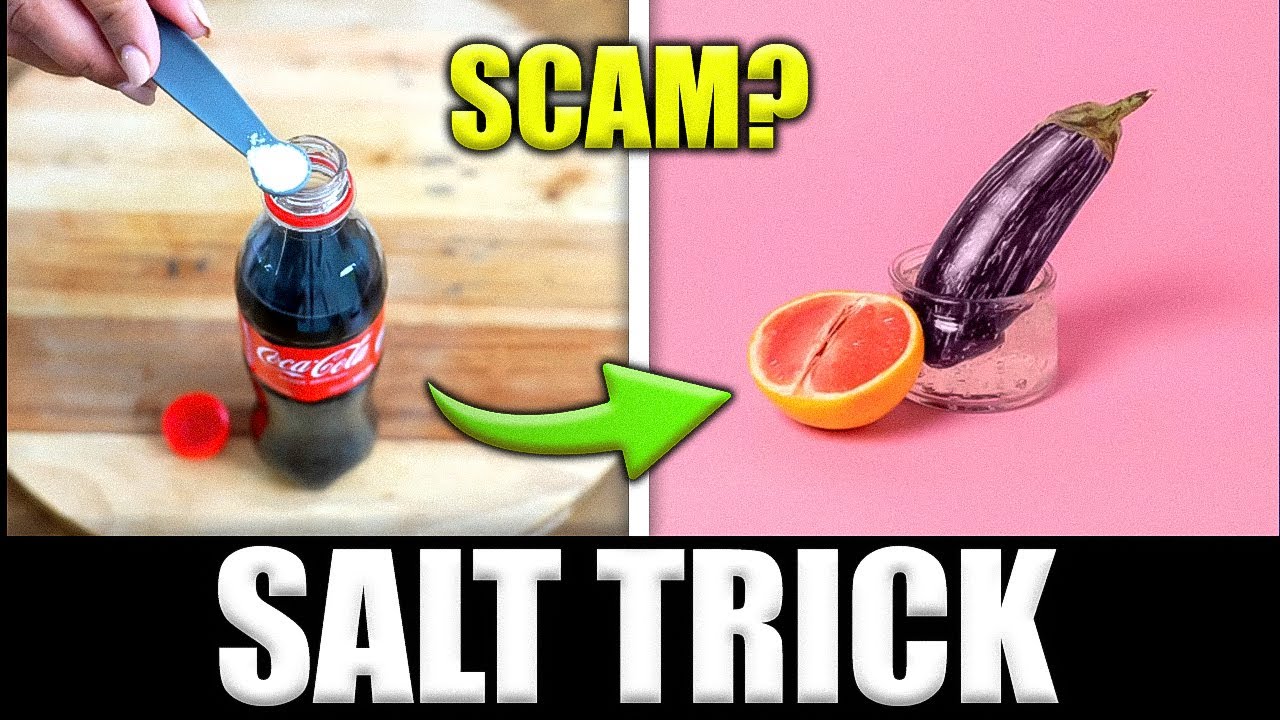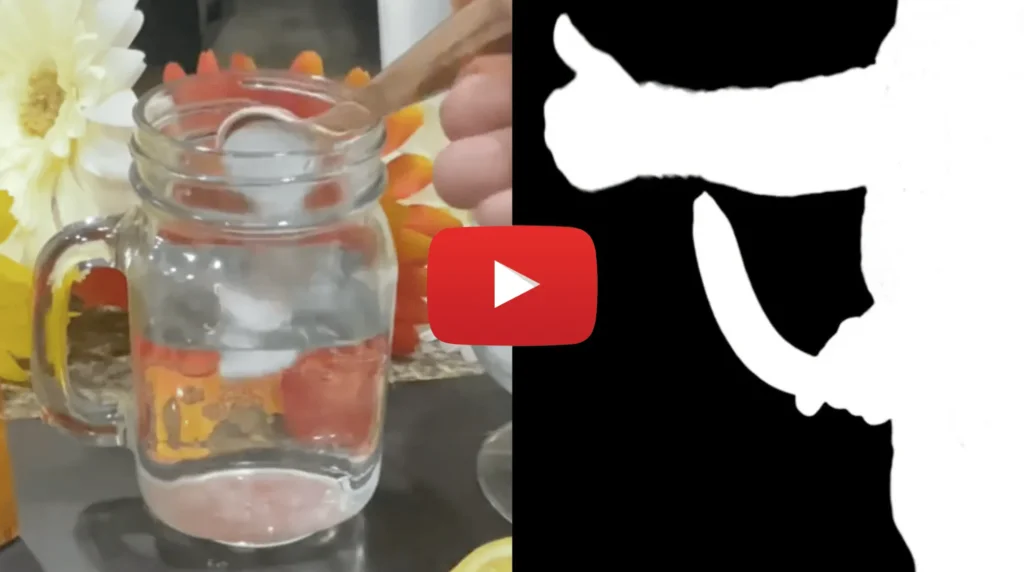Is Salt Trick Legit? The Ultimate Guide To Debunking Or Validating The Salt Hack
Alright folks, let's dive into this burning question: is the salt trick legit? You've probably seen it floating around on social media or heard whispers about it from friends. It’s one of those viral claims that promises to solve everyday problems with just a pinch of salt. But before you grab that shaker, we need to get to the bottom of this. Is it real science or just another internet myth?
Now, I get it—salt is magical stuff. It can enhance flavors, melt ice, and even clean your teeth if you're feeling adventurous. But when it comes to these so-called "salt tricks," are they backed by actual facts or are they just clickbait waiting to happen? We’ll break it down step by step, so stick around because things are about to get salty.
By the end of this article, you’ll have all the answers you need. Whether you're trying to figure out if salt really helps with acne, removes stains, or cures hangovers, we’ve got you covered. Let’s make sure you’re not wasting your time—or your salt.
What Exactly is the Salt Trick?
First things first, what exactly is this infamous "salt trick" everyone keeps talking about? Well, it depends on who you ask. Some people swear by using salt for skin care, others claim it’s the ultimate cleaning solution, and then there are those who think it’s some sort of miracle cure for everything under the sun. But is any of it true?
The salt trick generally refers to unconventional uses of salt beyond its traditional role in cooking. For example:
- Using salt as an exfoliant for smoother skin.
- Claiming salt can remove stains from clothes or carpets.
- Suggesting salt baths detoxify the body.
- Believing salt can reduce inflammation or swelling.
While some of these claims might sound plausible, others… well, let’s just say they need a little more scrutiny. That’s where we come in—to separate the facts from the fiction.
Why People Believe in the Salt Trick
Let’s be honest, humans love quick fixes. If someone tells you that sprinkling salt on your pimple will make it disappear overnight, it’s tempting to believe them, right? The idea behind the salt trick often stems from two main factors:
First, salt has been used for centuries in various cultures for medicinal and household purposes. Our ancestors relied on natural remedies, and salt was one of their go-to solutions. Second, modern science has proven that salt does have certain properties that could benefit us—like its ability to act as a natural disinfectant or dehydrating agent.
However, just because salt works in some cases doesn’t mean it’s a universal solution. We’ll explore this further in the next sections, but for now, just know that the hype around the salt trick isn’t entirely baseless—it’s just overstated in many instances.
Is Salt Really Effective for Skin Care?
Can Salt Treat Acne?
One of the most popular salt tricks involves using it to treat acne. The theory goes like this: since salt has antibacterial properties, applying it directly to your skin can kill acne-causing bacteria. Sounds legit, right? Not so fast.
While it’s true that salt can help disinfect minor cuts or wounds, using it on acne-prone skin can actually do more harm than good. Salt is highly abrasive, which means it can irritate and dry out your skin, potentially leading to more breakouts. Plus, overusing salt can disrupt your skin’s natural barrier, making it more vulnerable to infections.
Instead of reaching for the salt shaker, consider tried-and-true acne treatments like benzoyl peroxide or salicylic acid. These options are specifically formulated to target acne without damaging your skin.
Does Salt Exfoliation Work?
Now, let’s talk about salt as an exfoliant. This one actually has some merit. Salt scrubs are a common beauty staple because they effectively remove dead skin cells and promote circulation. However, there’s a catch—you need to use the right type of salt and apply it gently.
Coarse sea salt, for instance, can be too harsh for sensitive skin. Opt for finer salt grains or mix them with oil to create a gentler scrub. And always remember to moisturize afterward to keep your skin hydrated.
Can Salt Remove Stains?
Another common salt trick is using it to remove stains from clothes, carpets, or even wine spills. Believe it or not, this one checks out—at least partially. Salt’s absorbent nature makes it a great tool for lifting certain types of stains, especially those caused by liquids.
Here’s how you can use the salt trick to your advantage:
- For wine spills: Blot the stain with a cloth, then sprinkle salt generously over the area. Let it sit for a few minutes before rinsing with cold water.
- For grease stains: Mix salt with a bit of dish soap and scrub the area gently. Rinse thoroughly afterward.
- For rust stains: Combine salt with lemon juice to form a paste, then apply it to the stain. Leave it for a few hours before washing.
Keep in mind that not all stains respond well to salt treatment. For stubborn or set-in stains, you may need to resort to professional cleaning products.
Is the Salt Detox Bath Worth It?
Ever heard of Epsom salt baths? They’re all the rage in wellness circles, and for good reason. Epsom salt (which is technically magnesium sulfate) is said to help relax muscles, reduce inflammation, and even detoxify the body.
But here’s the thing—while soaking in an Epsom salt bath can provide temporary relief for muscle soreness, there’s no scientific evidence to support the claim that it “detoxifies” your body. Your liver and kidneys are perfectly capable of doing that job on their own.
That being said, if you enjoy the soothing sensation of a warm bath with Epsom salt, there’s no harm in indulging occasionally. Just don’t expect it to work miracles.
Does Salt Help with Hangovers?
Okay, here’s a fun one. Some people swear by the salt trick as a hangover cure. The idea is that salt helps replenish electrolytes lost during a night of heavy drinking, thereby reducing symptoms like dehydration and fatigue.
While it’s true that salt contains sodium, which is an essential electrolyte, relying solely on salt to cure your hangover isn’t enough. You also need to hydrate properly and consume potassium-rich foods like bananas or coconut water. A better option would be to reach for a sports drink or oral rehydration solution specifically designed to balance your electrolytes.
Scientific Evidence Supporting the Salt Trick
When it comes to evaluating the legitimacy of the salt trick, it’s important to look at the science behind it. Here are a few key points to consider:
- Salt has natural antibacterial and antiseptic properties, making it effective for certain cleaning and disinfecting tasks.
- Salt’s absorbent qualities make it useful for stain removal, especially with liquid-based stains.
- Excessive salt intake can have negative effects on health, including increased blood pressure and cardiovascular risks.
- Topical use of salt for skin care should be approached with caution to avoid irritation or damage.
Ultimately, the effectiveness of the salt trick varies depending on the specific application. Always do your research and consult experts when necessary.
Common Misconceptions About the Salt Trick
There are plenty of myths surrounding the salt trick that deserve to be debunked. Here are a few examples:
- Salt can shrink tumors: There’s no scientific evidence to support this claim. Tumors require medical treatment, not home remedies.
- Salt cures allergies: While salt water rinses can help clear nasal congestion, they won’t cure allergies outright.
- Salt prevents gray hair: This one is pure nonsense. Gray hair is caused by genetics and aging, not salt deficiency.
It’s crucial to separate fact from fiction when it comes to these kinds of claims. Relying on misinformation can lead to wasted time, money, or worse—health complications.
How to Safely Use Salt in Everyday Life
Now that we’ve explored the pros and cons of the salt trick, let’s talk about how you can safely incorporate salt into your daily routine. Here are a few tips:
- Use salt sparingly in cooking to avoid excessive sodium intake.
- Experiment with natural salt scrubs for exfoliation, but be gentle on your skin.
- Keep a box of salt handy for stain emergencies, but follow proper instructions for best results.
- Consider Epsom salt baths for relaxation, but don’t overdo it.
Remember, moderation is key. Overusing salt in any context can lead to unintended consequences, so always use common sense and seek professional advice when needed.
Conclusion: Is the Salt Trick Legit?
So, is the salt trick legit? The answer is—it depends. Salt is an incredibly versatile substance with numerous practical applications, but it’s not a magic wand. Some salt tricks, like stain removal or exfoliation, have merit when done correctly. Others, like curing hangovers or shrinking tumors, are nothing more than wishful thinking.
The key takeaway here is to approach every claim critically and verify the facts before jumping in headfirst. Salt is a powerful tool, but like anything else, it requires proper usage and understanding.
Now it’s your turn! Have you tried any salt tricks yourself? Did they work for you? Leave a comment below and let us know. And don’t forget to share this article with your friends so they can stay informed too. Let’s keep the conversation going!
Table of Contents
- What Exactly is the Salt Trick?
- Why People Believe in the Salt Trick
- Is Salt Really Effective for Skin Care?
- Can Salt Remove Stains?
- Is the Salt Detox Bath Worth It?
- Does Salt Help with Hangovers?
- Scientific Evidence Supporting the Salt Trick
- Common Misconceptions About the Salt Trick
- How to Safely Use Salt in Everyday Life
- Conclusion: Is the Salt Trick Legit?
Taryn Asher Weight Loss: The Inspiring Journey To A Healthier Life
Kat Timpf Baby Name: The Ultimate Guide To Choosing A Name Inspired By The Rising Star
Linda Cardellini Smoke: The Inside Scoop You Didn’t Know You Needed

SALT TRICK (⚠️SCAM OR LEGIT?⚠️) SALT TRICK FOR MEN VIDEO WHAT IS THE

Salt Trick Try 15 Second Health News

Transform Your Life with the Simple Salt Water Trick Is It Legit? by